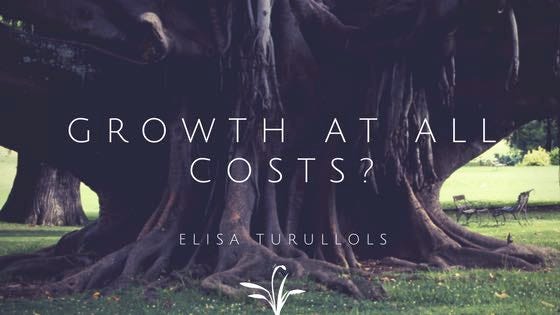Critiquing “Startup = Growth”

Let’s critique @paulg’s Sep 2012 essay “Startup = Growth” in our current context. Though it was “correct” at the time, I think it has socialized Growth Maximalism into Tech, which is bad for us. http://www.paulgraham.com/growth.html
Note: this is an example of general category of ideas that were “good” in the past, but don’t align with our current context.
- “Past Good, Present Bad”
- t = 0, y = 100; t = 1, y = 0
When you hate on the idea in the current context, people think you don’t like the idea in general. No. Ideas are instantiated in a context and should be evaluated within that context. They’re lenticular. In other words, this was a great PG essay for its time (which has now passed).
Let’s look at the essay itself.
”The only essential thing is Growth. Everything else we associate with startups follows from Growth. Growth is what you’re after. The good news is, if you get Growth, everything else falls into place. Which means you can use Growth like a compass to make almost every decision.”
Wow. So clear. Growth is built into the *identity* of Startups. If you’re a company that isn’t relentlessly focused on Growth, then you’re not a Startup (and don’t get to be part of the Silicon Valley identity).
This is an issue because: — Growth does not take externalities into account. — Startups take this Growth culture with them as they scale. Facebook’s culture is *still*: “we’re the little guy, growing at all costs to beat the big guy” even though they’re clearly “the big guy”. When Facebook wants more DAU + countries, they didn’t think about:
Creating an arms race for:
- Attention by hijacking addiction in the limbic system
- Data through Surveillance Capitalism
Or unique country impact:
- Arab Spring fragility
- Myanmar fake news → genocide
This argument is a specific example of the general claim: Maximalism bad. (Therefore, Growth Maximalism bad.) (Is being an Anti-Maximalism Maximalist ok? Answer is likely “everything in moderation, even moderation.”)
So…when should Startups take their Externalities into account? At the beginning you need to focus and can #SayNo to externalities. There’s no clear answer here. But Startups should vector towards taking externalities into account. (e.g. Lyft now carbon offsets all trips.)
PG then gives growth a metric (KPI) to turn it into an “optimization problem”. Early-stage Startups should focus on week-over-week growth. What about when W/W growth is not the KPI? This gets into double or triple bottom lines, plus recent innovations like B Corps.
As PG says:
“The fascinating thing about optimizing for growth is that it can actually discover startup ideas. You can use the need for growth as a form of evolutionary pressure.”
If we change our optimization function, what will we discover through evolutionary pressure? Also, he says:
“In theory this sort of hill-climbing could get a startup into trouble. They could end up on a local maximum. But in practice that never happens.”
If we think about the Startup/Tech Ecosystem as an entity itself, I think our hill-climbing has hit a local maximum.
Finally, PG’s essay should be updated given the state of 2018 digital infrastructure. He says:
“For a company to grow really big, it must (a) make something lots of people want, and (b) reach and serve all those people.”
And from that concludes software uniquely solves a+b.
But today, we have enough digital infrastructure (4B networked smartphones) to build info-based (rather than software-based) startups on top. Hashtag-based memes can virally spread. Should they count as Startup = Growth?